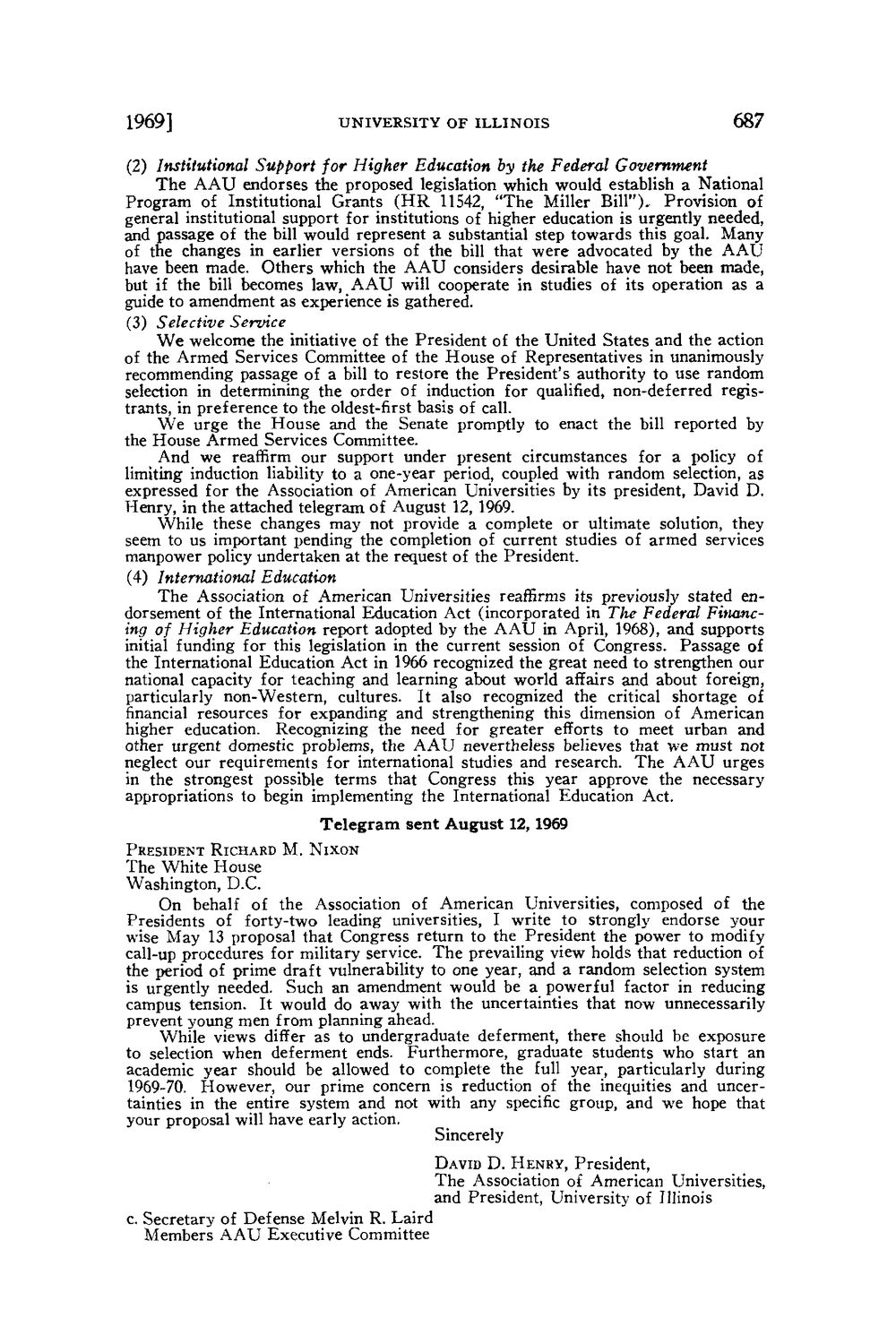| |
| |
Caption: Board of Trustees Minutes - 1970
This is a reduced-resolution page image for fast online browsing.

EXTRACTED TEXT FROM PAGE:
1969] UNIVERSITY OF ILLINOIS 687 (2) Institutional Support for Higher Education by the Federal Government The A A U endorses the proposed legislation which would establish a National Program of Institutional Grants ( H R 11542, "The Miller Bill"). Provision of general institutional support for institutions of higher education is urgently needed, and passage of the bill would represent a substantial step towards this goal. Many of the changes in earlier versions of the bill that were advocated by the AAU have been made. Others which the A A U considers desirable have not been made, but if the bill becomes law, A A U will cooperate in studies of its operation as a guide to amendment as experience is gathered. (3) Selective Service W e welcome the initiative of the President of the United States and the action of the Armed Services Committee of the House of Representatives in unanimously recommending passage of a bill to restore the President's authority to use random selection in determining the order of induction for qualified, non-deferred registrants, in preference to the oldest-first basis of call. We urge the House and the Senate promptly to enact the bill reported by the House Armed Services Committee. And we reaffirm our support under present circumstances for a policy of limiting induction liability to a one-year period, coupled with random selection, as expressed for the Association of American Universities by its president, David D. Henry, in the attached telegram of August 12, 1969. While these changes may not provide a complete or ultimate solution, they seem to us important pending the completion of current studies of armed services manpower policy undertaken at the request of the President. (4) International Education The Association of American Universities reaffirms its previously stated endorsement of the International Education Act (incorporated in The Federal Fitumcing of Higher Education report adopted by the A A U in April, 1968), and supports initial funding for this legislation in the current session of Congress. Passage of the International Education Act in 1966 recognized the great need to strengthen our national capacity for teaching and learning about world affairs and about foreign, particularly non-Western, cultures. It also recognized the critical shortage of financial resources for expanding and strengthening this dimension of American higher education. Recognizing the need for greater efforts to meet urban and other urgent domestic problems, the A A U nevertheless believes that we must not neglect our requirements for international studies and research. The A A U urges in the strongest possible terms that Congress this year approve the necessary appropriations to begin implementing the International Education Act. Telegram sent August 12, 1969 PRESIDENT RICHARD M. N I X O N The White House Washington, D.C. On behalf of the Association of American Universities, composed of the Presidents of forty-two leading universities, I write to strongly endorse your wise May 13 proposal that Congress return to the President the power to modify call-up procedures for military service. The prevailing view holds that reduction of the period of prime draft vulnerability to one year, and a random selection system is urgently needed. Such an amendment would be a powerful factor in reducing campus tension. It would do away with the uncertainties that now unnecessarily prevent young men from planning ahead. While views differ as to undergraduate deferment, there should be exposure to selection when deferment ends. Furthermore, graduate students who start an academic year should be allowed to complete the full year, particularly during 1969-70. However, our prime concern is reduction of the inequities and uncertainties in the entire system and not with any specific group, and we hope that your proposal will have early action. Sincerely DAVID D. HENKY, President, The Association of American Universities, and President, University of Illinois c. Secretary of Defense Melvin R. Laird Members A A U Executive Committee
| |